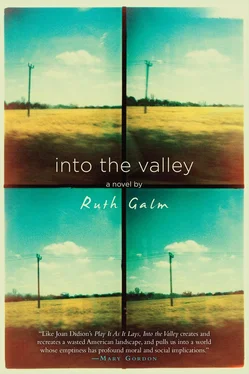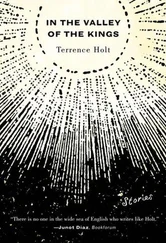“Why haven’t you done any with me? Did they catch you or something?” the girl went on without missing a beat. “Well they won’t recognize me.”
“I could help you,” she said. “I could help with your sickness or whatever.”
For a moment, the idea held B. Someone to take away the affliction, to lay her down and pat her hair and tell her stories. But the girl’s tired face and disordered hair hardened in front of her and B. knew this girl possessed no such balm.
The teller windows returned to her. The perfect squares of wood and glass, the soothing ivory walls. She must get rid of the girl.
The girl was still at it. “I see how the whole lady getup is the angle now. I can do that, like last night. I can do the lady thing, no problem.”
“The dresses are dirty,” B. protested. “They’re too big.”
“You said last night it fit perfectly,” the girl retorted. B. suddenly understood her as the druggist had, something out of a German fairytale, vicious and hungry, not to be let in the door.
“I’m not asking for fifty-fifty. Whatever’s fair. Any bread will help. For me and Jed, for our trip.”
“We’ll do the next one together,” the girl was saying. “We can trade off. I’ll do it and you can see how good I am and then you decide how much. And if you don’t, I’ll report you.”
Everything was moving in its own dreamy, gel-like substance inside the carsickness. “I want to see the gold rush park first,” B. said. “The one the man at the gas station told us about.” She felt inexplicably that the gold rush park was the next step in the journey: the girl’s threat, her chatter, the park — all of them ripples inside the thick, surreal wave that would get her back to the banks. No need for any plan. Now she understood. The banks were the only plan.
“Bunch of hicks came and missed the gold, got syphilis and died, the end.”
“I want to see the park first,” B. said implacably. “I don’t care what we do after that.”
“Fine. It’s your trip. But don’t stall on me.”
B. took the small road back to the freeway. She pointed the car in the direction of the foothills. Leaving the valley now had its own part in the dream-gel logic. The girl chatted on, almost nervously, about how she’d stolen from five and dimes and corner stores since she was little. B. flattened the girl’s voice into a distant hum. The slope rose almost imperceptibly as they drove, and then all of a sudden they were in the foothills, the anise scent in the bleached grasses and the hunched oak trees and the valley behind remote and blurred.
There were no landmarks near the sign. B. parked in the shadeless lot near a few picnic tables. The heat sucked instantly inside the car. She gathered her purse and sat for a moment, looking out the window. “I won’t be long,” she said. The girl said nothing.
At the park entrance, a ranger stood in a shack. A transistor radio crackled behind him, the baseball game organ scaling up and down, the cheers of the crowd listless ripples in the heat. Under the man’s ranger hat he wore dark wraparound glasses so that B. couldn’t see his eyes. “It’s self-guided,” he said, handing her a pamphlet. “Over a hundred years of state history in one park, ma’am. Happy prospecting.” A languid cheer whined from the game.
A lizard with no tail skittered in front of her. A series of small signs appeared along the trail: “Ten thousand men crowded the bank here in search of a dream. But the dream was elusive.” The signs went on about claims and sluice boxes and the few who struck any gold and the multitudes who left destitute. The women were cooks and madams. B. remembered reading that somewhere.
She came to a stack of pans by the river, apparently for trying your own hand at panning. She picked one up and removed the bone-colored heels and climbed slowly into the freezing water. The cold woke her up out of the dream-gel substance, made her sharp and lucid inside the spinning. She moved into the water. The edges of the cut on her foot gilled. She bent down and shoveled up the dirt and shook it around the pan. Nothing. She dumped and tried again, shimmying the rocks and sand and coming up empty again, her hands turning blue in the icy water. She tried once more, the sharp buzzing in her head and throat. It would be easy to keep trying it all day, she saw, to go on hoping and waiting for something to appear. In frustration she tossed the pan into the water and watched it float away. She walked out of the river to one of the oaks and sat. From her spot she saw the girl get out of the car, climb onto a picnic table, light a cigarette and lie back in the sun. B. shivered. She reached into the ostrich-skin purse reflexively for a check, forgetting they were in the glove compartment. Instead she came up with the knife from the buttes.
She examined it for a long moment. Its sleekness was comforting to hold. She angled the blade so the sun glinted off and it gave her a feeling of sudden reassurance, as if she could reach into her purse and find whatever she needed. She leaned against the oak tree and let the comfort of the knife wash over her.
When she got back to the Mustang, the girl was in her seat with the door open, feet on the concrete, painting her nails with B.’s nail polish.
“You hit the motherlode?” The girl did not look up from her strokes. Her long hair was out of the bun now and back in her face. The bubblegum pink did not obscure the dirt in her nails. B. walked to the driver’s side without responding.
“We should do it now,” the girl said then. “Strike while the iron’s hot.” She was brushing out a last line of her big toe, swabbing the remnants with her fingernails.
B. was still at the oak tree, on a calm plane above the girl. “I don’t think it’s a good idea,” she answered.
“I didn’t ask whether it was a good idea,” the girl snapped. “If you don’t let me, I’ll turn you in.”
The absurdity of the conversation, the threat, did not touch B. She started the engine and backed out before the girl could move. “Shit, let me close the door!” The girl scrambled to get her feet in. After that, the girl remained silent for a while, having sensed the shift in mood. They drove down a two-lane road from the park and at the first gas station, B. turned in.
“You can change in the bathroom,” B. said.
“I need you to help me,” the girl said.
In the single restroom with its urinal and green flickering light, B. pulled the powder-blue dress out of the travel bag and thrust it at the girl. She got out her makeup case and haphazardly brushed eye shadow and mascara and blush onto the tan face.
“You can’t wear my heels anymore.”
“Why not?”
B. ignored her. “We’ll go to the nearest town with a store and a bank and get you your own shoes.”
“I’m not paying.”
B. yanked the girl’s hair back into a chignon as best she could. The girl said nothing, just stared at her face in the green-lit mirror, in the warm smell of urine and mothballs.
In the car, the girl began talking nervously again.
“It’s just that I don’t have those housewife hang-ups, you know. He’s free, I’m free. But if I come back with the bread, well, the groupies can’t give him that.” She absentmindedly smoothed the wrinkled lap of the dress as she spoke.
The next town they reached was two short blocks, a Mexican restaurant and an insurance shop on one side, a fabrics and sewing supply store on the other. Next to that a clothing store. B. parked in front. She noticed as she got out that the girl was still wearing an anklet, a strip of dark leather with hanging white shells. The girl should have taken off the anklet. “Wait here, I don’t want them to see you,” B. said. In the clothing store, there were outfits for everyone and everything — overalls, wedding dresses, toddlers’ rompers. A crescent-shaped display of shoes for all occasions. B. chose a pair of white pumps in her own size.
Читать дальше










